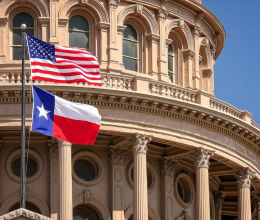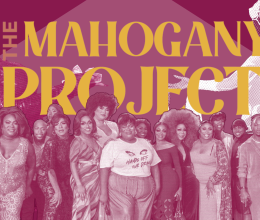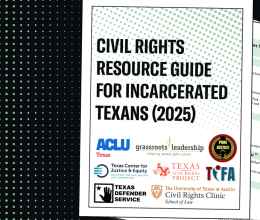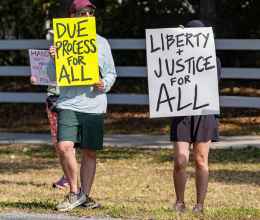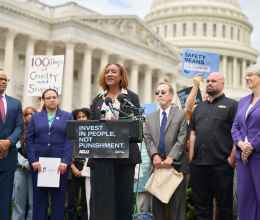
Edric Wilson sat in jail for 18 years for a murder he did not commit. He was held without bail for the first 12 years. When he was eventually assigned a set bail of $850,000, neither he nor his family could afford it, so he remained in jail for six more years.
“If my bond had been lower and at a reasonable level, which the law requires, I could have been out with my family, out working, out living my life. In reality, I was stuck. I was living a life sentence as a guilty person,” Wilson said. “Not innocent until proven guilty, but guilty until proven innocent.”
Texas’ money bail system keeps thousands of legally innocent people in jail simply because they cannot afford to pay their way out. This two-tiered system of justice favors the wealthy and punishes everyone else — harming families, communities, and our entire state.
Jailing Texans because they cannot afford bail violates norms of fairness and our constitutional right to due process.
WHAT IS BAIL?
When someone is arrested in Texas, a judge typically sets an amount of money the person must pay to be released. This is called “money bail.” If you pay this money, you can go home while you wait for your next court date.
There are two ways to pay money bail. The first way is that you can pay the full amount to the court. In these instances, money bail functions like a security deposit — the court holds your money, and when you show up for your trial, you get your money back. The other way is that you can use a bail bondsman if you don't have the full amount upfront. With a bondsman, you usually pay a fee, typically 10 percent of the total bail amount, and they pledge the full amount of the bond to the court and guarantee your appearance as required. You don't get that fee back, even if you show up to court or the case is dismissed — that's their fee for posting the bond.
This system is inherently flawed. Your freedom depends on your wealth. Someone with money can go home while awaiting trial. Someone without money either stays in jail or loses money they can't afford to a bondsman, even if they're innocent.
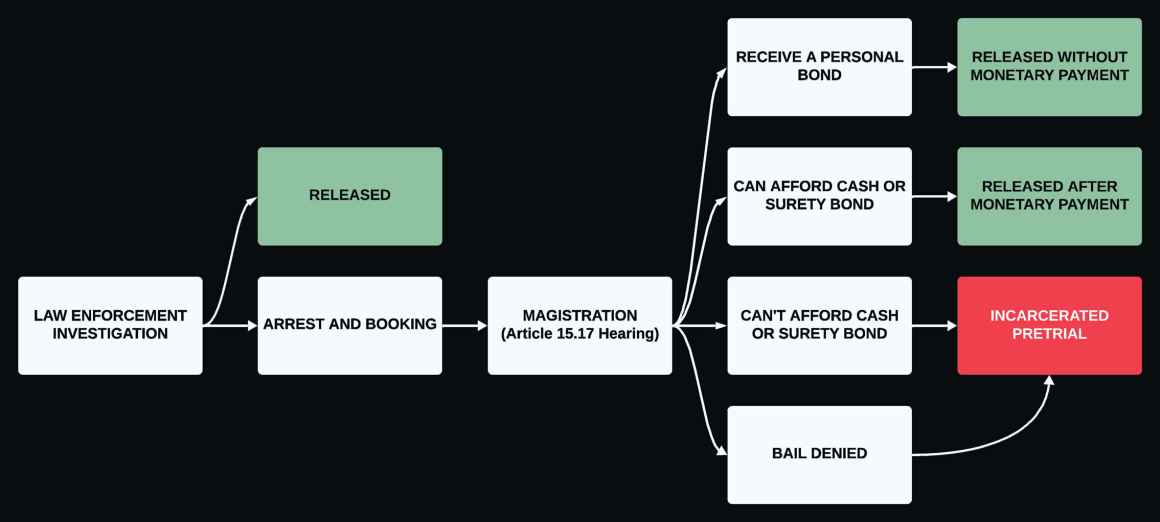
Diagram demonstrating the bail process
MONEY BAIL DOESN'T WORK
Pretrial detention and money bail are not supposed to be a punishment. Yet, because Texas implements a money bail system, it becomes naturally discriminatory, inflicting a penalty on those who don’t have enough money to post bail.
Magistrates routinely set bail amounts exceeding what families are able to pay. As a result, Texas jails are overpopulated, full of people awaiting trial. On any given day, county jails detain over 53,000 people who have not been found guilty of a crime. This costs Texans around $1.2 billion in taxes annually, which instead could be spent on housing, education, mental health, and other measures that keep communities safe.
Laquita Garcia was incarcerated for nearly a year because she couldn’t afford bail. When she went to trial, she was found not guilty.
“During that year, my children, who were teenagers, were left to fend for themselves as we tried to navigate our home life via jail calls,” she said.
Her 17-year-old daughter had to apply for food stamps to feed herself and her two younger brothers.
Research by the National Institute of Corrections shows that money bail doesn't improve public safety or court appearance rates. In fact, studies consistently find that people detained before trial are more likely to plead guilty (even when innocent), more likely to be sentenced to jail time, and receive sentences that are twice as long on average.
Let us be clear: Money bail doesn't work.
MONEY BAIL CAUSES REAL HARM
Texas’ money bail system has devastating impacts on individuals, families, and communities across the state.
Money bail creates racial inequality. People of color are disproportionately affected by money bail and pretrial detention. Research concludes that Black people have higher rates of pretrial detention and are subject to higher bail amounts than their white counterparts. Bail amounts are consistently higher for Black and Brown defendants, even though they are less able to afford money bail. Additionally, Black and Latine people are more likely to have higher rates of bail denial than white people.
Money bail costs taxpayers a fortune. Housing a person in jail costs an average of $62.41 per day, which means that Texas counties are spending roughly $3.3 million a day jailing individuals before they have been convicted of a crime. Much of that money is spent on jailing those who pose little risk to the community, who will not be convicted, or who will have their case ultimately dismissed.
Money bail and unnecessary pretrial detention makes communities less safe. Wealth-based and unnecessary pretrial detention makes Texas less safe. Studies show that holding people in jail for any amount of time during the pretrial period is linked to an increase in crime. When bail decisions are based on money instead of safety, the results are unpredictable and unfair. Often, these decisions get handed over to bail bond companies whose main concern is profit, not protecting the community. Another study found that the longer people were held in detention, the more likely they were to be rearrested, even years after the case and regardless of whether the person was convicted. Point blank: Money bail does not reduce crime.
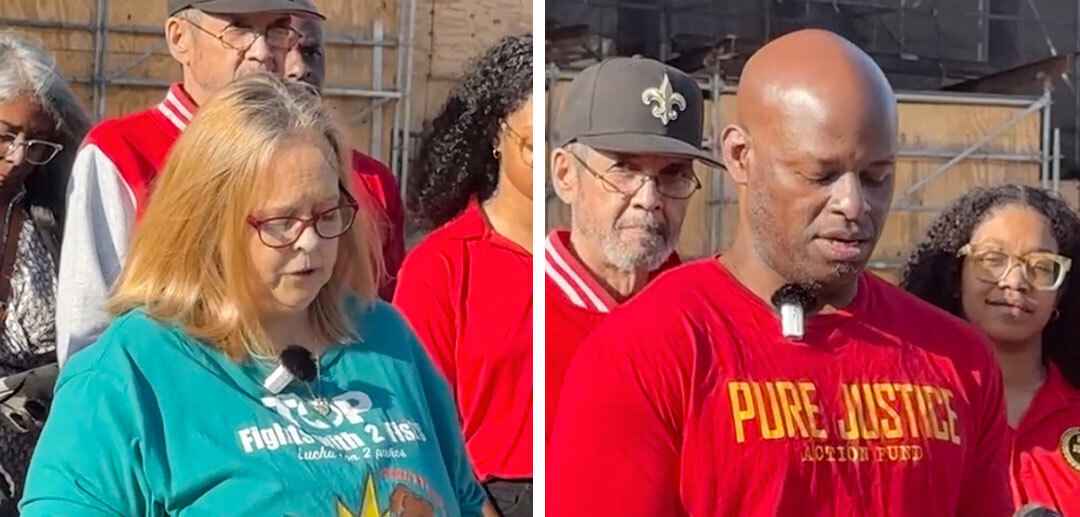
WHAT ARE LAWMAKERS DOING?
Instead of working to fix these problems, Texas politicians have been taking steps to make it worse. Legislators doubled down on money bail when they passed Senate Bill 6 during Texas’ 87th Legislative Session and Senate Bill 9 during Texas’ 89th Legislative Session.
Senate Bill 6 prohibited release from jail of certain people without first paying money bail, taking away judicial discretion to safely release people on a case-by-case basis. This money bail requirement imposed an absolute bar on release for people who are too poor to afford their bail, while allowing identically-situated people with money to purchase their freedom.
Senate Bill 9 further entrenches Texas’ money bail system in two ways. It gives prosecutors power to delay pretrial release for up to 20 days simply by objecting to a bond amount set by a judge. It also expands the list of offenses, including some misdemeanors, where people must pay for their freedom, increasing the number of people jailed before trial regardless of their ability to pay.
These two laws perpetuate a heartless system that causes immense harm to all Texans. Lawmakers should be ashamed they passed bills that make our money bail system even worse.
But we can still advocate for real solutions that will make our state safer and fairer for all Texans, regardless of our background.
THE PATH FORWARD
Texas’ money bail system is corrupt. It is not an integral part of our justice system. It is an artificially engineered, cruel system that discriminates against people without money and disproportionately affects Black and Brown Texans.
Texas politicians should provide real solutions to keeping our communities safe: well-paying jobs, affordable housing and health care, and well-funded public schools — so that families of every color and background can thrive, no exceptions.
Rather than continuing to waste money and harm Texans, we need a rational and balanced approach to pretrial incarceration and release. Some solutions include:
- Establishing a presumption of release. If Texas keeps money bail, it should be used as a last resort when a judge is reviewing a case to assure Texans are only able to be held in custody when there is clear evidence they pose a flight risk.
- Guaranteeing lawyers at initial court appearances. Judges will often make better, more informed decisions when a lawyer is present at the bail decision. When an attorney is present, safety outcomes are maintained, pretrial release for those who pose little risk is increased, courts are more efficient, and there is less monetary waste.
- Using proven tools to prevent missed court dates. Courts should adopt best practices to improve the pretrial process. This can include sending text reminders before court dates and redesigned citation forms that clearly emphasize critical information like court dates.
Join us in our effort to end money bail by signing our petition and joining our network of advocates across the state. We also welcome you to attend KB Brookins’ writing workshop for carceral justice on August 11. Brookins is one of our artists-in-residence, focused on drawing attention to the human impact of pretrial detention in Texas jails, with a particular focus on Harris County.
Money Bail, Many Fails
by KB Brookins
How much is my life
worth: two cancer sticks & a chuckle?
How many times
must I sit inside walls
inside a system misusing the word justice?
If a system can be paid off,
is it a system of government?
Does a government need citizens to live?
Sometimes, I think the DA is out to get me.
Sometimes, I wonder how they sleep at night
turning a profit on daughters and uncles, too.
Is a business the same as a city?
Asking for a friend; you know,
the one who can’t make bail.
I wonder if the word “penance”
has ever been uttered in jail. I wonder if they use
Malcolm X’s jail time as the rule
& not the exception.
“Criminal” & “justice” is an oxymoron.
Meaning I am now reduced to property.
Black people never stopped being property,
they started being prisoners or dead.
Dead people can’t stage protests,
said the ballot box boxing me out via felony.
When rich boys get to have childhoods
and broke boys get to have hashtags,
who learns a lesson then?
Why are the broke boys always colored?
I wonder what you get when you mix a
misdemeanor with a District Judge,
A court case with old testaments,
a tendency to pry cash
(always cold & coded in the law
as theirs to steal from those they see
as thieves) you get something like
justice. We’re hungry for our rest.
